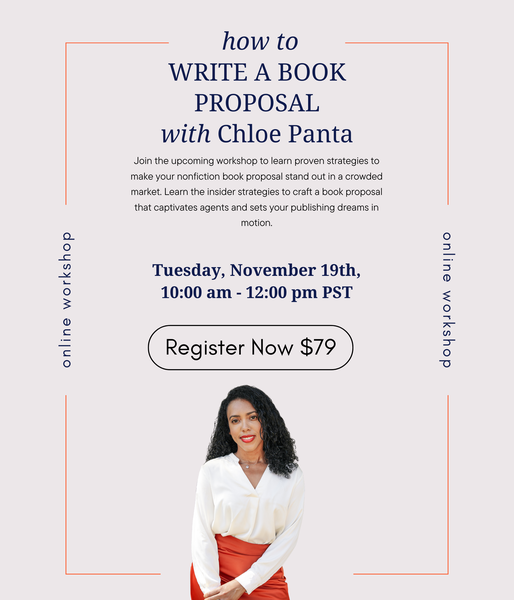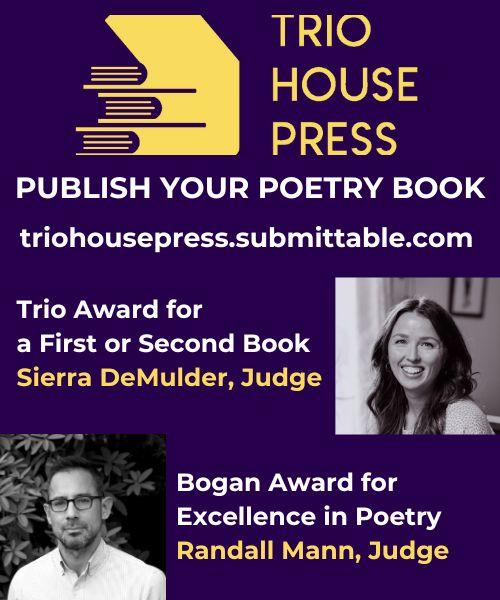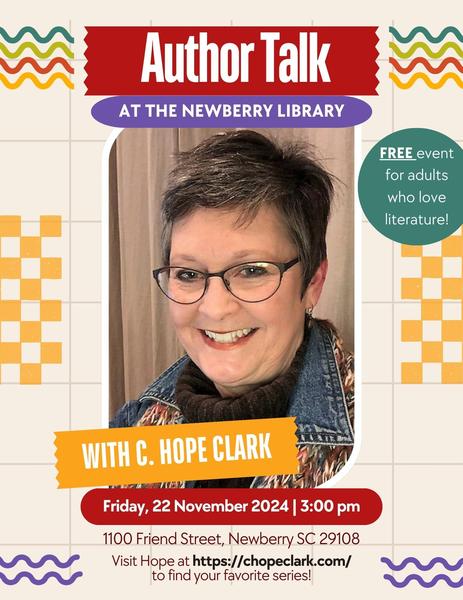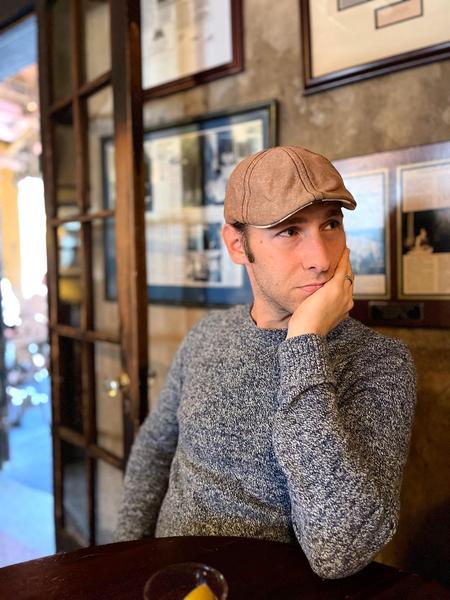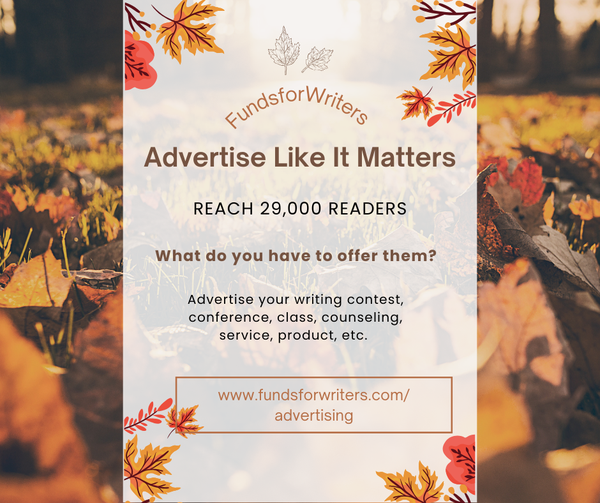VOLUME 24, ISSUE 47 | november 15, 2024 |
LOVE YOUR
PATH I spoke at the Marlboro County Library in Bennettsville, SC this week. It was a two-hour drive, but hubby and I needed to get out, and I simply adore a good book club visit. I have been to a lot of book clubs. Each has its own temperament. This time, I was headed to a very rural community where authors don't bother going. They combined three book clubs for a total of about 50 people. We had lovely snacks. I spoke for what turned into two hours because I was having such a great time, they were asking fantastic questions, and, honestly, we were having a ball. That little event turned into not only a fun one, but one in which I earned a room full of new readers
who each intend to run through all 20 of my mysteries. The financial reward tripled what I expected. And they gave me food and flowers to take home for the trip. This was the old South that I remembered. This was a place where time stands pretty still. Yet they made a huge splash for me not just in sales of books, but in readership and long-term fans. All because I took the time to drive way
out in the middle of nowhere and give them an afternoon to remember. They were the warmest group I've visited with in a long, long time. Truth was, they don't realize how much they jump-started me back into my writing world. It's been a hard few weeks in my life. This evening made me remember why I do what I do, and I left with the biggest smile on my face and bounce in my step. Yeah, it's not just about how many books you sell. |
Taught by Chloe Panta, nonfiction author and writing coach This 2-hour live
workshop will teach you the secrets of crafting a book proposal that agents can't resist—so you can finally bring your book to life. You'll learn proven strategies to make your proposal stand out in a crowded market. From pinpointing your book's unique value to presenting yourself as the must-have author for your genre, this workshop equips
you with the tools to captivate agents from the very first page. We'll also cover: - How to identify your book's "hook" and communicate why readers (and publishers) will want it now.
- How to create an irresistible overview that shows agents why your book
deserves their attention.
- How to position yourself as an expert and establish credibility that reassures agents and publishers alike.
- Common proposal pitfalls that cause rejections—and how to avoid them.
This workshop is ideal for writers of all backgrounds, whether you're working on memoir, history, self-help, or another nonfiction genre. If you're serious about getting your book into the right hands, this workshop is the perfect place to start. WHO YOU WRITE FOR
Just last night, I was assisting a grandson on how to write his paper for class. It was a paper in which he was to do research, actually do an experiment, and come to a conclusion. He wrote
it per guidelines. He clearly wrote it for a teacher. That opened the conversation about defining who will read your writing before writing the piece, because it alters the flavor of the piece. For instance, if he writes a creative, fiction piece, he writes it for a certain age group, maybe a certain culture, an audience hoping for a good story . . . not for the teacher. That made him think. He
hadn't been told in class just who his audience was. Recently Literary Hub published a piece about this. Students write for the professor. The grading is based on guidelines, thoroughness, and if a point
was properly made. It wasn't written to touch the reader, educate the reader, or gain a following by resonating with the reader. It's written for a grade. The point was a teacher has to grade the paper. That's what they get paid to do. The student will get feedback. Quality is very subjective, and usually limited to one person's opinion. The student knows they will be read. We've all heard the horror stories of a teacher who bashed a paper only for the student to quit writing or postpone doing so for years. The sad thing is that the student is only being taught to write for that teacher. The writing is usually more academic in nature. There's a big lesson missing. On the other hand, if
classroom writers are taught to write for the class, or for a subjective online audience that may quit reading after the first paragraph if not entertaining enough, the gymnastics shift. The mindset of the writer changes. More minds will be exposed to the writing. A wider net needs to be cast to entertain, educate, or attract the reader. We hear the cliche so many times about "know your
audience." Stop and think about it for a change. It can really alter how you write. It can determine whether your work sells or not. It can give your writing life. -November 22, 2024 - Newberry Library - Newberry, SC - 3 PM -November 23, 2024 - Irmo Chapin
Holiday Market, Crooked Creek Recreation Center, Chapin, SC - 8AM - 2PM -January 9, 2025 - Newberry Fine Arts Club, Newberry, SC - 10AM -April 23, 2025 - Artist 5 Show, Newberry Opera
House, Newberry, SC - 6 PM -May 17, 2025 - Pelion Library Book Club, 206 Pine St, Pelion, SC, Saturday, 1-2PM
Email: hope@chopeclark.com to schedule events, online or otherwise.
Success is walking from failure to failure.
~Winston Churchill <<If you have a success story you believe was prompted by FundsforWriters, please share with us! Send to hope@chopeclark.com >>
|
|
|
How I Traditionally Published Nine Novels Without an Agent
By Douglas Weissman Fact: I am a novelist and travel
writer.
Fact: I have published nine novels.
Fact: I don’t have an agent.
Fiction: The path to publication is straightforward. Imagine a labyrinth. Erase the walls. That's publishing. After my MFA program I stepped into the maze-less puzzle—lost. I queried the novel I had completed as my thesis. Rejection, rejection, rejection. I wasn’t cutting through the maze at all. I connected with a small publisher named Epic Press looking for
freelancers to write book packages—a project in which the publisher creates the story concept and the writer creates the story. They wanted not one book, but six. A series, they said, about a voyage to nowhere, on frozen waters, with orphans. I gave them a writing sample. I showed them a short story I had published. They gave me a thumbs up. The project was a crash course in world-building. Six books written, edited, and revised in 14 months. They had another series in mind. Six new books; New Adult, about freshman year of college—a different author for each book. Was I interested? Of course, I was. Why did they like me? Maybe it was my writing style. Most likely it was the fact I turned my submissions in on time and didn’t make a fuss. Seven books now published. I still wasn’t clear of
the labyrinth. I queried agents for my literary novel. And the rejections came, or no responses came, or few requests for full came. I had spent nearly a decade on a single book—writing, editing, querying, revising, querying, sharing with others, revising, and querying. For Book Eight, instead of researching what agents wanted, I looked for small presses who may be interested in my book reminding me that every word, every sentence, every story— no matter how small—was a step forward if done
well. In the decision to query publishers directly, the path became clearer. Not because the labyrinth gained structure, but because I learned to navigate the chaos. An indie publisher was interested in Book Eight, Histria Press. We had some back-and-forth over the contract. I agreed. We were both excited. The novel I had started as my thesis in graduate school would see the light of day—after 11
years. By the time I finished Book
Nine, it never occurred to me I should have reached out to my Book Eight publisher. Instead, I started the query process over, but this time knowing who I would reach out to, understanding Between the Lines Publishing interested in Historical Fiction—a book about a serial killer, about Paris, and about World War II. I ultimately decided my
success could be reduced to seven steps: 1. Diversify your approach: Don't limit yourself to one publishing path. Explore various options, including literary magazines, book packagers, and independent presses. 2. Build your portfolio: For instance, start with short story publications to gain
credibility and confidence. 3. Research thoroughly: Understand the publishers you're pitching to and tailor your submissions accordingly. 4. Network: Attend writing conferences, join writing groups, and connect with other authors to learn from their experiences, insights into the industry, and
possibly their own connections. 5. Embrace different genres: I've written fiction and non-fiction, travel essays and young adult. This versatility opened up more opportunities. 6. Be open to feedback: Use constructive criticism to improve your craft and make your work more
marketable. 7. Be persistent: Rejection is part of the process. Keep writing, keep improving, and keep submitting. I am writing my tenth novel. I’m
still in the maze but now I carry the lessons of the previous nine books, only now I see it as a box I can think outside of. Bio:
Douglas Weissman is an award-winning travel writer and author of 9 novels. He writes stories of friendship, of finding beauty in the grotesque, of finding magic in the mundane, and stories to try and capture the attention of the reluctant reader he once was. He is a graduate of the Master of
Fine Arts program in Creative Writing at the University of San Francisco and currently lives in Los Angeles with his gorgeous wife, fun-loving daughter, anxious dog, and indifferent cat. By the time you read this, he will probably have another cat.
|
QUILL PROSE AWARD
https://redhen.org/awards/quill-prose-award/
$10 ENTRY FEE. Deadline November 30, 2024. Submit 25,000-word minimum (approximately 150 pages,
double-spaced, Times New Roman 12pt font); prose (fiction or nonfiction) by a queer writer only. Award is $1000 and book publication by Red Hen Press. Red Hen Press seeks to work against the negative politics of labeling while honoring and empowering authors who identify as queer. ROBERT DEMOTT SHORT PROSE CONTEST
https://quarteraftereight.submittable.com/submit/307706/2024-robert-j-demott-short-prose-contest
ENTRY FEE $15 for three pieces. Deadline December 1, 2024. Submit up to three previously unpublished pieces. Each piece must be 500 words or fewer. Any genre is acceptable as long as the work is written in
prose. Send us your best short-short stories, micro-essays, and prose poems (lineated poems will not be considered). Combine all pieces into one document. All entries will be considered for publication in Quarter After Eight. Prize: $1,008.15 + publication in the next edition of Quarter After Eight. KARMA FICTION CONTEST
https://momentmag.com/karma-fiction-contest/
$25 ENTRY FEE. Deadline December 1, 2024. Contest encourages writers to submit stories related to Judaism or Jewish culture or history. Moment will award up to three prizes to outstanding works of unpublished short fiction with Jewish content, including $1,000 for first place. For each entry, submit an original
short story—maximum length 5,000 words— with Jewish themes. LASCAUX PRIZE IN SHORT FICTION
https://lascauxreview.com/contests/
$15 ENTRY FEE. Deadline December 31, 2024. Stories may be previously published or
unpublished, and simultaneous submissions are accepted. Winner receives $1,000, a bronze medallion, and publication in The Lascaux Review. Length should not exceed 10,000 words. All genres and styles are welcome. ALPINE FELLOWSHIP POETRY PRIZE
https://alpinefellowship.com/poetry-prize
Deadline March 1, 2025. Awarded for
the best poetic response on the 2025 theme, which will be announced in January. The winner and runners-up will receive cash prizes and will be invited to attend our annual symposium. First place: £3,000. Second place: £1,000. Third place: £1,000. Will also offer up to £500 travel expenses to help with travel to the event and meals and accommodation during the symposium dates are also covered. Open to all nationalities. You may submit one poem or a collection of poems as long as all the poems in
the collection speak to the theme. There is a maximum of 500 words per entry.
GRANTS / FELLOWSHIP / CROWDFUNDING NATIONAL ENDOWMENT FOR THE ARTS
https://www.arts.gov/grants/creative-writing-fellowships/program-description
Offers $25,000 grants in prose (fiction
and creative nonfiction) and poetry to published creative writers that enable recipients to set aside time for writing, research, travel, and general career advancement. Fellowships in prose (fiction and creative nonfiction) will be offered in FY 2026 and guidelines will be available in January 2025. You may apply only once each year. OLIVE O'CONNOR FELLOWSHIP IN CREATIVE WRITING
https://www.colgate.edu/academics/departments-programs/department-english-and-creative-writing/creative-writing-fellowship
Deadline Jan 06, 2025. This annual fellowship is designed to support writers completing their first books. It
provides a generous stipend, office space, and an intellectual community for the recipients, who spend one academic year at Colgate University. In return, each fellow teaches one multigenre creative writing workshop per semester and gives a public reading of their work. The fellowship includes a stipend of $57,100, travel expenses, health and life insurance. One fellowship in fiction. One fellowship in poetry. UNIVERSITY OF WISCONSIN WRITING FELLOWSHIPS
https://creativewriting.wisc.edu/fellowsapply/
Deadline January 1, 2025. Each year, the WICW Poetry and Fiction Fellowships award stipends of at least $40,000 and generous health benefits, to five emerging writers of poetry and
fiction. To be eligible, applicants must have completed or be scheduled to complete an MFA or PhD in Creative Writing by August 15 of the fellowship year (at least one week before the fellowship would begin). Eligible applicants may have published no more than one full-length collection or book of poetry, fiction, or creative nonfiction as of the March 1 deadline. Individuals who have never published a full-length collection or book remain eligible, of course. NEW MEXICO WRITERS GRANT PROGRAM
https://nmwriters.org/
The New Mexico Writers annual grant program is intended to support New Mexico authors in a variety of literary endeavors. The program features a competition for funding new works or works in progress by writers from
all populations and geographic areas of New Mexico, as well as members from the greater Navajo Nation. Grants are between $500 and $2,000 and are awarded at the New Mexico Writers annual dinner, where grantees are honored as special guests. The next annual dinner will be held on April 17, 2025 at La Fonda on the Plaza in Santa Fe which means the guidelines for entering will be forthcoming soon. Subscribe to the newsletter to be notified. ARTERRA RESIDENCIES
https://artistrunalliance.org/initiatives/arterra-2/
https://form.jotformeu.com/ARTErra/arterra-application
https://arterra.weebly.com/
ARTErra is a multidisciplinary art residency programme placed in the green and friendly village of Lobão da Beira. Our project aims hosting artists by providing them with accommodations, work place ,cultural exchanges and ideas with the community and other artists. We accept application from artists who work in all
disciplines and at any stages of their career. Location Tondela, Portugal.
MEGABUILDS
https://ytjobs.co/job/18679
We are looking to hire multiple talented scriptwriters to join our MegaBuilds team on a long-term basis. You will be responsible for creating informative and
engaging scripts that stand out through its storytelling. $300 for a script with 1500-2500 words. $350 for a script over 2500 words. When applying, please submit samples of your previous work. If your application seems suitable for the position, we will ask you to write an individual sample of 400-500 words relevant to our channel. In the final step, we will set up a call to learn a little bit more about you, while we tell you more about our channels and workflow. PODCASTLE
https://podcastle.org/guidelines/
Deadline November 30, 2024. PodCastle is looking for quality fantasy fiction. If you’re a writer with a speculative short story that you’d like to hear narrated by one of our
performers, we’d like to see it. Word count: up to 6,000 words. We pay $0.08 per word USD for original fiction, $100 flat rate for reprints over 1,500 words, and $20 flat rate for flash fiction reprints (stories below 1,500 words). PodCastle publishes stories in both text and audio. You are indicating both are available when you submit your story. ORI
https://ori-mag.com/pages/contributor-guidelines-and-protocol
Deadline December 5, 2024. Ori Magazine is open for pitches for our Spring edition: The Growth Issue. Award-winning print magazine for travelers. Columns $200, features $.50-$1/word. Please send your pitches to kade@ori-mag.com. Particularly interested in regions
around the U.S., Australia, and New Zealand this go around. TRICYCLE MAGAZINE
https://docs.google.com/forms/d/e/1FAIpQLSdho02tI0dGpNaML6LusvbzuTEskWLH4NY-z8ka6N2GBv6BVg/viewform?embedded=true
https://tricycle.org/contact/
Deadline December 15, 2024. We can only consider submissions relating to Buddhism. First send us a one-page query outlining your idea, any
relevant information about your Buddhist and writing background, your familiarity with the subject of your proposal, and so on. If you have clips or writing samples, please send these along with your proposal. Pays $250+ per piece more or less. Prefers articles between 500–2,000 words.
LAWLEY PUBLISHING
https://lawleypublishing.com/submissions/
Publication will be considered for: Children’s fiction and nonfiction picture books, Early Reader fiction and nonfiction chapter
books, Middle Grade fiction and nonfiction. Lawley Publishing does not publish Young Adult fiction and nonfiction, Adult fiction and nonfiction, Board Books. FREMANTLE PRESS
https://fremantlepress.com.au/submissions/
Fremantle Press welcomes unsolicited manuscripts from authors of Western Australian origin or whose main place of residence is Western Australia. Work by non–Western Australian authors will be considered when the subject matter has a strong Western Australian focus. This applies to all genres we publish. We accept manuscripts in the genres of non-fiction, fiction and narrative non-fiction, poetry, and books for children and young adults. We also welcome portfolio
submissions from photographers and illustrators. SPENCERHILL LITERARY AGENCY
https://www.spencerhillassociates.com/
Specializing in commercial fiction, romance and women's fiction, and expanding into middle grade and young
adult, they work with talented writers in every genre at any stage of their career-from the well-known, successfully published and established author to the debut writer with an exciting new voice. Based in Florida, the agents travel to industry conferences nationally and internationally. TRELLIS LITERARY MANAGEMENT
https://www.trellisliterary.com/submissions
Please read the team bios, and then select an agent from the list and follow the instructions on their QueryManager page. If interested in reading further, they will contact you within 6-8 weeks of your submission. Their interests range from literary to commercial to genre-bending fiction, from narrative to memoir to pop culture
nonfiction and everything in between. BENBELLA BOOKS
https://benbellabooks.com/pitching-benbella/
BenBella Books is a publishing boutique that publishes around 40 books a year, is very selective in what it acquires, and
works with great diligence to publish each book to its maximum potential. Actively acquiring strong nonfiction manuscripts. Not looking for fiction at this time. They are a marketing-focused house that prides itself on creative and diligent marketing of our titles. They have a team of four full-time marketers for our relatively small list of titles, and work with a range of top-notch outside publicists, as well. Pays advances in the range of $5,000 to $20,000 for most books, but for books they
really want, they offer profit-sharing deals with extraordinary upside. Pays standard big-house royalties or better, including full royalties on most special sales and author sales.
Please forward the newsletter in its entirety. To reprint any editorials, contact hope@fundsforwriters.com for permission. Do not assume that acknowledgements listed in your publication is considered a valid right to publish out of ours.
C. Hope Clark
E-mail: hope@fundsforwriters.com
140-A Amicks Ferry Road #4
Chapin, SC 29036
http://www.fundsforwriters.com Copyright 2000-2024, C. Hope Clark
ISSN: 1533-1326 Our subscriber list is NOT made available to others. Use information listed at your own risk. FundsforWriters gives no warranty to completeness, accuracy, or fitness of the markets, contests, and grants although research is done to the best of our ability. FundsforWriters finds open submission calls, contests, and markets from a wide variety of sources, including Erika Dreifus' Practicing Writer newsletter, Erica Verrillo's blog, Authors Publish, Poets & Writers, Duotrope,
Winning Writers, Write Jobs Plus, LinkedIn Jobs, Emily Stoddard, and other newsletters and online sites. Many announcements are submitted directly to FundsforWriters. All must be paying opportunities. Contests must pay a minimum of $200 first place. Submit potential listings to hope@chopeclark.com **Note that FundsforWriters.com places paid advertising in this newsletter. ALL ads are related to writers and the business of writing, screened by FundsforWriters to make sure the information is suitable for writers and their endeavors to improve their careers. While the mailing list is not sold to third parties, other parties do advertise in the newsletter, to include
the occasional solo ad. You will not receive this newsletter without your permission. It's physically impossible since recipients must opt-in, giving us permission to send the newsletter. If at any time you no longer wish to receive the newsletter, click the UNSUBSCRIBE link at the bottom of each newsletter. We want you to enjoy this newsletter at your pleasure, not be forced to read anything you do not wish to receive. Direct any complaints, suggestions, and accolades to Hope Clark at hope@fundsforwriters.com. We are an anti-spam site. | |
|
|
|


